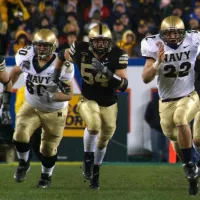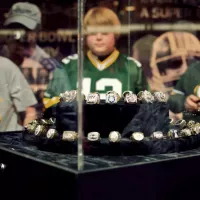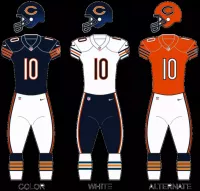How Barry Sanders built a successful career. Explore key moments that defined the journey.
Barry Sanders was a professional football running back renowned for his exceptional agility and elusiveness. He played ten seasons in the NFL for the Detroit Lions, leading the league in rushing yards four times. Prior to his NFL career, Sanders had a record-breaking season at Oklahoma State in 1988, rushing for 2,628 yards and 37 touchdowns. He was awarded the Heisman Trophy and unanimously recognized as an All-American. Sanders is considered one of the greatest running backs in NFL history.
1940: Last Lions Rushing Leader
In 1990, Barry Sanders was the first Lions running back to lead the league in rushing yards since Byron White in 1940.
1958: Lions' Previous Postseason Win
The Detroit Lions hadn't had a postseason win since 1958, when they finally won in 1991 with the help of Barry Sanders.
1970: NFL-AFL Merger Completion
Since the completion of the NFL-AFL merger in 1970, the Detroit Lions had limited postseason appearances.
1983: Lions' Previous Playoff Season
Before Sanders joined, the Lions had not had a season at or above .500 since their most recent playoff season in 1983.
1986: Oklahoma State University Enrollment
In 1986, Barry Sanders enrolled at Oklahoma State University and played for the Oklahoma State Cowboys. During his first season, he rushed for 325 yards and two touchdowns.
1987: All-American as Return Specialist
In 1987, Barry Sanders led the nation in yards per kickoff return and was named a second-team College Football All-American as a return specialist.
1988: Record-Breaking College Season
In 1988, Barry Sanders had a record-breaking season in college football, setting college football season records with 2,628 yards rushing, 3,250 total all-purpose yards, 234 points, 37 rushing touchdowns, and 39 total touchdowns.
1988: Starting Role
In 1988, Thurman Thomas moved to the NFL, which allowed Sanders to become the starter for his junior year in college.
1989: One of Best Rookie Seasons
Barry Sanders' 1989 season is regarded as one of the best all-time by a rookie running back.
1989: Drafted by Detroit Lions
In 1989, Barry Sanders was drafted third overall by the Detroit Lions in the NFL draft, thanks to the endorsement of head coach Wayne Fontes.
1989: Rookie Season with the Lions
In 1989, during his rookie season, Barry Sanders started 13 games for the Lions. He finished the season with 1,470 rushing yards and 14 touchdowns, earning the NFL Offensive Rookie of the Year Award and a Pro Bowl selection.
September 9, 1990: Touchdown Against Buccaneers
On September 9, 1990, in the Lions' regular season opener, Barry Sanders had 79 yards from 14 rushing attempts and a goal-line touchdown against the Tampa Bay Buccaneers.
September 1, 1991: Inactive due to sore ribs
On September 1, 1991, Barry Sanders was inactive for the Detroit Lions' game against the Washington Redskins due to sore ribs. The Lions suffered a 45-0 shutout loss, which was their worst in over 20 years.
November 24, 1991: Dominated against the Vikings
On November 24, 1991, Barry Sanders dominated against the Minnesota Vikings, rushing for 220 yards on 23 attempts and scoring four touchdowns. The Lions won the game 34-14, and Sanders dedicated the win to his teammate Mike Utley who suffered a career-ending spinal cord injury the previous game.
1991: First Postseason Win Since 1958
In 1991, Barry Sanders helped lead the Detroit Lions to their first postseason win since 1958, marking a significant achievement for the team.
September 13, 1992: Game against the Minnesota Vikings
On September 13, 1992, Barry Sanders had 26 attempts for 66 yards against the Minnesota Vikings.
November 25, 1993: Injury against the Chicago Bears
On November 25, 1993, during a game against the Chicago Bears, Barry Sanders suffered a torn medial collateral ligament (MCL) and a torn posterior cruciate ligament, forcing him to leave the game and miss the last five games of the regular season.
September 11, 1994: Struggled against the Minnesota Vikings
On September 11, 1994, Barry Sanders struggled in a game against the Minnesota Vikings, recording 12 attempts for only 16 yards. The Lions lost the game 10-3.
September 25, 1994: Memorable Run Against Patriots
On September 25, 1994, Barry Sanders had 18 attempts for 131 yards and two touchdowns against the New England Patriots. He had a memorable 39-yard touchdown run where he juked and spun past Patriots safety Harlon Barnett.
1994: Led NFL in Rushing Touchdowns
In 1994, Barry Sanders led the NFL in rushing touchdowns, showcasing his ability to score and make a significant impact on the game.
1994: NFL Offensive Player of the Year
In 1994, Barry Sanders was awarded the NFL Offensive Player of the Year Award, recognizing his outstanding performance that season.
1995: 1995 Season achievements
In the 1995 NFL season, Barry Sanders recorded 314 attempts for 1,500 yards and 11 touchdowns. He was selected to the Pro Bowl and named an AP first-team All-Pro. The Lions made the postseason as a wild card, losing to the Philadelphia Eagles in the Wild Card Round 58-37, in what was then the highest-scoring postseason game in NFL history.
1996: 1996 Season Achievements
In the 1996 NFL season, Barry Sanders led the league in rushing yards with 1,553 yards from 307 attempts and 11 rushing touchdowns. He made the Pro Bowl and was named an AP second-team All-Pro. By the end of the 1996 season, he had 11,725 career rushing yards, ranking seventh all-time, and 84 career rushing touchdowns, ranking eighth all-time.
December 21, 1997: Reached 2,000 Rushing Yards
On December 21, 1997, in the season finale against the New York Jets, Barry Sanders reached 2,000 rushing yards for the season on a two-yard run. He finished the game with 23 attempts for 184 yards and a touchdown, helping the Lions win 13-10 and clinch a playoff berth.
1997: Co-won NFL Most Valuable Player Award
In 1997, Barry Sanders co-won the NFL Most Valuable Player Award with Brett Favre after rushing for 2,053 yards in 16 games, making him the third running back to surpass 2,000 yards.
1997: MVP and 2,000-Yard Season
In 1997, Barry Sanders rushed for 2,053 yards and was co-awarded the NFL Most Valuable Player Award with Brett Favre. He also received his second NFL Offensive Player of the Year Award.
1997: Named NFL Offensive Player of the Year
In 1997, Barry Sanders was named NFL Offensive Player of the Year for the second time, reaffirming his exceptional talent and impact on the game.
September 13, 1998: Sanders Records 185 Rushing Yards Against Bengals
On September 13, 1998, Barry Sanders rushed for 185 yards on 26 attempts with three touchdowns against the Cincinnati Bengals in week 2. However, the Detroit Lions lost the game 34-28.
November 26, 1998: Sanders Has a Down Game Against Steelers
On November 26, 1998, Barry Sanders had a less productive game against the Pittsburgh Steelers, rushing for only 33 yards on 20 attempts. Despite his performance, the Lions won the game 19-16 in overtime.
December 27, 1998: Sanders' Final Game
On December 27, 1998, in the last game of his career, Barry Sanders rushed for 41 yards on 19 attempts in a 10-19 loss against the Baltimore Ravens.
July 27, 1999: Sanders Announces Retirement
On July 27, 1999, Barry Sanders announced his retirement from professional football, just before the Lions' training camp was scheduled to begin. He made his decision public through a faxed letter to The Wichita Eagle.
November 25, 2004: Number Retired by the Lions
On November 25, 2004, Barry Sanders' number 20 was retired by the Lions.
October 10, 2011: Introduced Monday Night Football Game
On October 10, 2011, Barry Sanders introduced ESPN's Monday Night Football game between the Chicago Bears and the Lions.
Mentioned in this timeline

Basketball is a team sport played on a rectangular court...

Amazon Prime is a subscription service offering a variety of...

Brett Favre is a retired NFL quarterback renowned for his...

College football is a popular amateur sport in the United...

The Super Bowl is the annual championship game of the...

The Chicago Bears are a professional American football team based...
Trending

24 minutes ago Cameron Boozer: Duke Forward, Elite Numbers, and Wooden Award Favorite

25 minutes ago Josiah Harrell's Sensational UFC Debut After Rare Brain Disease Diagnosis: A Houston Story

25 minutes ago Rajah Caruth shines at JR Motorsports; Mayer takes pole; Mears avoids crash.

25 minutes ago Anthony Black scores 20 points in Magic's Thursday's victory, Desmond Bane contributes.

26 minutes ago Yaxel Lendeborg's life story, Michigan rise, and draft prospects are revealed.
1 hour ago Alabama Basketball Faces LSU: A Crucial Road Matchup and Maturity Test Looms
Popular

Jesse Jackson is an American civil rights activist politician and...

Barack Obama the th U S President - was the...

Ken Paxton is an American politician and lawyer serving as...

Bernie Sanders is a prominent American politician currently serving as...
Randall Adam Fine is an American politician a Republican who...

Michael Joseph Jackson the King of Pop was a highly...
